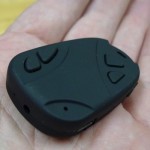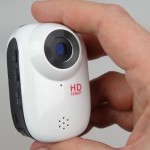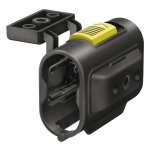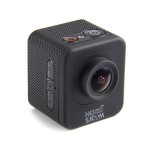Still far from being a PRO, but I now have a GoPRO… a GoPRO 4 Silver, to be exact.
So far I’ve been using essentially 2 action cams, which I have written about earlier: A Sony HDR-AS30V and a SJCam M10. Both had “goods” and “bads”, but after having done this for a while I thought I needed something better.
After some research I went for the GoPRO 4 Silver edition. I did consider the most expensive model, the Black Edition, for a while, but what won me over to the silver was the ability to see what the camera is filming without having to use a mobile phone over Wi-Fi or something else. The Silver has a touch sensitive LCD display on the back which makes configuring it a lot easier, in addition to actually showing the picture on display and being able to playback straight away.
The Black edition is more powerful, but I didn’t think I was going to start uploading 4K videos to YouTube any time soon.
I also wanted the ability to produce better time-lapse videos. On a long distance bike ride it usually takes many hours to get to the destination. No one, not even die-hard cycling fans, have the patience to watch it for that long (real cycling aficionados use to time to do the real thing, rather than watch it on a screen).
One of my biggest problems with the Sony and the SJCam was the minimum picture interval of 5 seconds. When going downhill, at higher speeds, 5 seconds covers a lot of distance. It becomes especially difficult to keep the notion of continuity if there are many curves or turns, so I was looking for a camera that could do it at intervals of at least 1 second. The newer GoPRO models not only can do it with a minimum interval of 0.5 second (in addition to intervals of 1, 2, 5, 10, 30 and 60 seconds), but it can actually create the video directly in the camera, with no editing needed. You get the real thing straight out of the camera… Great! … and it does work!
One thing I’ve learned in life is that there are always “buts”…
So, it does work, BUT…
 Time-Lapse Videos
Time-Lapse Videos
I’ve learned that the desired 1 sec interval produces video which is way too fast for my taste. What I mean is, the camera takes take 1 frame (picture) each second, but when it produces the video it packs way too many frames per second (not sure how many really, haven’t checked, but must be between 15 and 24). With the 5 sec intervals of the Sony, I was producing time-lapse videos with 3 frames per second, which after many tests, seemed to produce the best results fir my “taste”. I couldn’t find a setting in the GoPRO to define how many frames per second you want the time-lapse video to contain. If anyone knows how to do that, please message me.
On the bright side, it eliminates the “continuity” issue I described above and produces a very “time compressed” 4K video in a small file size, for example a 13 minutes ride was compressed in a 22 seconds video. Some of my Camino de Santiago bike rides had something like a 6 hours duration or more. I can perhaps extrapolate that a 6 hours bike ride would be compressed to just over 7.5 minutes.
I have not tested this, but I believe if I increase the interval to 2 or 5 seconds I will end up with the same issue as described with the Sony camera and still unable to change the rate of frames per second the camera uses when creating the video.
The video below was produced by the camera (I only added the logo and titles in editing) at 1 second intervals on a 4K resolution. Note that YouTube reduces the quality of the original video.
There is also the option to actually configure the camera just to take and store the pictures and not to produce the video. I could then take the many thousands of pictures and produce the time-lapse video myself in a video editing software, as I have been doing, but that is one of the most boring things and that take the most time.
There are only 2 options in resolution. The massive 4K picture size, which means it produces a video of 3840 pixels width and 2160 pixels height. Although things are evolving fast, still most TVs and monitors cannot truly display that type of resolution and only recently YouTube added the 4K option to video uploads. The other option is a 2.7K video (2704 pixels width and 2032 pixels height) which is created in the 4:3 (square) ratio. I could definitively use this resolution, if it was on a wide 16:9 ratio, but not on the old 4:3 one.
 Video Recording
Video Recording
There are plenty of GoPRO videos in YouTube and it is not my intention to compete with the professionals in the area (either a professional YouTuber of camera man), but I had, obviously to do my own tests. I am massively disappointed by the fact the new top range GoPRO models do NOT have image stabilization. The Sony I use does and it is excellent. Even the old GoPROs (the HEROs) have image stabilization, so why did GoPRO remove this feature from their most expensive cameras is beyond me. They are supposed to be action cameras, right? And action usually means shaking. Yes, they say you can stabilize the video in editing later, but why do we have to go that extra work if this was already there on their previous models? This was a major let down! I am not returning the camera because of the lack of image stabilization, as I will be keeping my Sony Action Cam and will likely use it to record full HD videos and use the GoPRO mostly for the Time-Lapse option (even though there is no image stabilization in time-lapse either), but (let me say it again) this is a massive disappointment for something considered the best in the market these days.
The video below is a direct upload to YouTube of the video recorded by the camera. When I tried to edit the video to add the logo and title my video editing software produced only a green screen (perhaps some codec issue).
I found this video in YouTube while researching if there was anyway to get the camera do stabilize the image and I think the benefits are very clear here…
Well, that’s it! If this post was useful, please share, comment and let me know if you liked it or not by clicking on the rating stars below.
Thank you!







